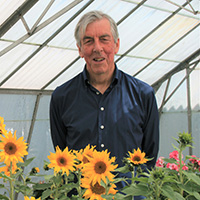 Dr. Steve D. Wratten (deceased March 2021), Distinguished Professor of Ecology at Lincoln University and science leader at the Bio-Protection Research Centre in New Zealand, was elected as an ESA Fellow in 2019. He is a recognized world-leading researcher in agro-ecology, with a focus on the biological control of pests. He created the world's first and only biodiversity trails in vineyards and led the "beetle bank" team in the United Kingdom.
Dr. Steve D. Wratten (deceased March 2021), Distinguished Professor of Ecology at Lincoln University and science leader at the Bio-Protection Research Centre in New Zealand, was elected as an ESA Fellow in 2019. He is a recognized world-leading researcher in agro-ecology, with a focus on the biological control of pests. He created the world's first and only biodiversity trails in vineyards and led the "beetle bank" team in the United Kingdom.
Steve was born in London, England. He attributes his interest in entomology to a school teacher who took him and others on "nature walks" after school. He received a B.Sc. (Hons), zoology, from the University of Reading in 1968, followed by a Ph.D. in ecology from the University of Glasgow in 1972 and an M.A. from the University of Cambridge. Steve went on to be awarded a D.Sc. from the University of Southampton in 1996. He was elected as a Fellow of the Royal Society of New Zealand in 2004. A further D.Sc. followed in 2006 from The University of Copenhagen, Denmark. He holds three doctorates and four professorships. He has won teaching, research, and communication awards. In 2019 he became a prestigious James Cook Fellow in New Zealand.
He is a proponent of using crop and non-crop plants to provide SNAP—shelter, nectar, alternative food, and pollen—to natural enemies of pests. This approach restores and enhances ecosystem services or "nature's services" in agriculture, thereby improving the environment and enhancing biological control of pests. He has pioneered the use of non-native and endemic New Zealand plant species in agriculture to enhance insect pest control and in this way reduce insecticide use. The methods developed by his team and trialed in the Waipara wine-growing region in Canterbury, New Zealand, are now in use in every vineyard region in New Zealand and Australia, as well as regions of the United States and Europe.
He has published approximately 400 journal articles, eight books, and 90 book chapters, and has supervised more than 90 Ph.D. students to completion. He has published papers in high-profile journals, including Nature, Ecology, Ecology Letters, PNAS, and Proceedings of the Royal Society of London. In 2014, he was named among the top 10 authors in the centenary editorial of the international journal Annals of Applied Biology.
Steve is an exceptional communicator of science and is frequently invited to speak at international conferences and workshops. He is a visiting professor at Charles Sturt University, Australia; Northwest Agriculture and Forestry University, China; and Fujian Agriculture and Forestry University, China.
Married to Claire, with two children and a large number of grandchildren, Steve also writes for print media in New Zealand at a rate of up to 40 columns each year. He is a mad birder—the most important book in his study is Birds of the World, which contains all of his global bird "ticks." He is also a keen vegetable gardener and worships Bob Dylan.
(updated September 2019)
